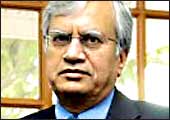 |
Last year, Baillie took over as
the CEO, but decided to maintain a low profile in media. That,
however, didn't go against Hindustan Unilever
Douglas Baillie/HUL |
Stop
Press: There's RIL In My Headline
Once again, Mukesh Ambani's Reliance Industries
tops the charts as the most written about company in India Inc.
Mukesh Ambani may not love Indian
media much, but the media loves him and his Reliance Group just
the same. So, when Business Today commissioned Delhi-based image
monitoring firm, Cirrus, to find out who were the biggest newsmakers
in corporate India (starting this year, the BT-Cirrus study considers
Union economic ministers as well) last year, it didn't come as
a surprise that Ambani's Reliance Industries had once again topped
the charts.
After all, 2006 was a big year for Reliance Industries (and
we are not talking about Reliance Retail, which is considered
as a separate entity for the purpose of this study). The year
began with RIL formally handing over control of the four demerged
companies (Reliance Natural Resources, Reliance Communication
Ventures, Reliance Energy Ventures and Reliance Capital Ventures)
to Ambani's younger brother Anil, with whom he split in 2005.
Soon thereafter, American oil giant Chevron announced that it
was picking up a 5 per cent stake in Reliance Petroleum for $300
million, with an option to increase the stake to 29 per cent.
And when the company, which plans to set up a Rs 27,000-crore
refinery with a capacity of 580,000 barrels a day, came out with
its IPO in April, it was oversubscribed 50 times.
 |
Land for the contentious small
car project in Singur kept Tata Motors in public glare last
year, but the coverage wasn't all negative
Ravi Kant/ Tata Motors |
For good reason: the group that created the equity
cult in India was coming out with an IPO after 13 long years. It
got more press when, in October, a section of the Jamnagar refinery
caught fire, and some more when just a little over a month later,
Reliance reported that the unit was up and running in record time.
On top of it all, Reliance was continuously in the news for its
mega special economic zone (SEZ) plans.
But here's the thing about Reliance Industries. While it may
top in terms of visibility (which is a function of the size of
the article, its position in the publication and the readership
of the publication) and image (determined by the tone of coverage:
positive, negative or neutral), its overall quality of exposure
is lower than that of several companies, including tech giants
Infosys Technologies and Wipro, and FMCG giant Hindustan Lever
(now called Hindustan Unilever). Compared to Infosys' quality
of exposure score (QoE) of 157 per cent, Wipro's 154 and HUL's
153, Reliance racks up 111 per cent.
 |
| Jagdish Khattar/ Marut | | 


